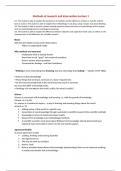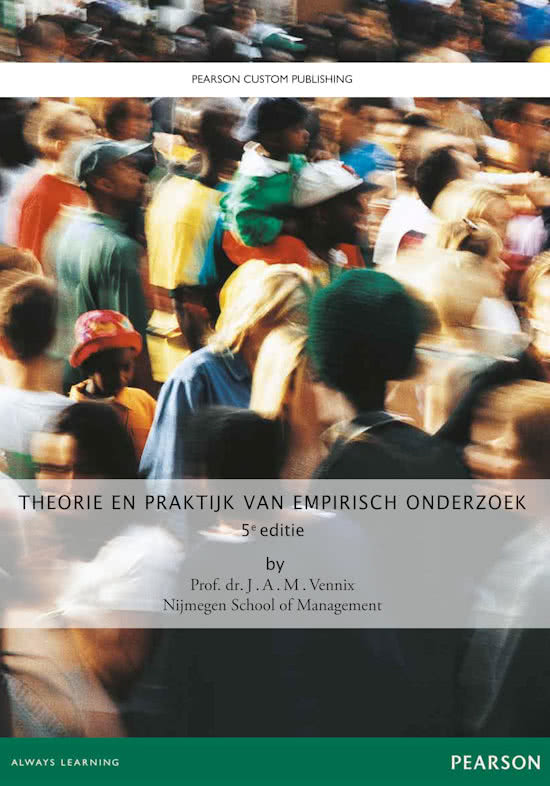Methods of research and intervention Lecture 1
O1: The student is able to explain the importance of methods and the difference of facts in ‘real life’ and the
facts in science. The student is able to explain that methodology is not about using ‘recipes’, but about thinking.
O2: The student is able to answer (content related) questions about the basics of methodology and to analyse
texts on methodological errors and illogical reasoning.
O3: The student is able to explain the difference between objective and subjective reality and can reflect on the
consequences of this difference for scientific research
Biases
Selective perception & inaccurate observations
- Makes us understand reality
Why methods are important
- Understand what is already known
- Know how to ask *good* new research questions
- How to answer those questions
- Communicate findings.. and their limitations
‘’Thinking is more interesting than knowing, but less interesting than looking’’ – Goethe (1749-1832).
• Science is about knowledge
• Many things that we know, we know on a base of agreement.
• So the way two people look at the world may have much in common
but may also differ at essential points
• Ontology: the way we see the world, reality. But what is reality?
Science
Science is concerned with knowledge and learning, i.e. with the growth of knowledge
(Vennix, ch. 2 p.25).
So: science is a method of inquiry – a way of learning and knowing things about the world
around us. 24
Making sense of the world in a specific way
Generation of new knowledge through systematic (scientific) research (the scientific method)
Knowledge in terms of statements about reality
Research for knowledge uses methodology/methods
A scientific assertion must have logical (follows from knowledge already destructed) and
empirical (have to be able to show it in the real world) support.
Agreement Reality
To reach agreement reality:
Looking, thinking and knowing (Goethe)
And agreement on
1. The way we work as scientists
2. How to ‘look’
3. How to translate observations into knowledge (epistemology) how can we measure anything
in reality and transfer that to knowledge
,Looking for reality
What is real (ontology)
Epistemology – the science of knowing; systems of knowledge
Methodology – the science of finding out; procedures for scientific investigation
Science is a method of inquiry – a way of learning and knowing things about the world around us
So science deals with logic and with the real (empirical) world
It is not about It is not about metaphysics, belief, moral opinions or ethical values, how
important those concepts might be in daily life
Logical Reasoning
Logic P -> Q
It is important how the connection between p and q works.
There are four options:
1. p is true -> what about q?
2. p is not true (¬ p) -> what about q?
3. q is true -> what about p?
4. q is not true (¬ q) -> what about p?
Example in Vennix: When it rains the street gets wet
p = it rains; q = the street gets wet
1. 1 is quite clear; when p -> q
2. 2 is more difficult: it does not rain -> what can we say about q? q is not per definition untrue
3. 3: also difficult: the streets get wet -> what can we say about p? P is not per definition true;
4. 4: this one is easy again: ¬q →¬p
Uncertainty -> you don’t know
assumpution -> you can only say something when you have the information
Shortcoming of human inquiry in general
Inaccurate observations (cf. visual puzzles). example start lecture from rocks. Your
observations make you look at reality a certain way
Overgeneralizations (“all...are...”), “Fooled by Randomness”
Selective perception/observation (seeing what you expect tom see, common patterns)
Confirmation bias (looking for proof, dismissing other info). during covid a lot of confirmation
bias
Illogical reasoning (“the exception that proves the rule”, gambler’s fallacy, cf. logical puzzles).
,Overgeneralizations
Fact: women are better at multitasking than men. Yes or no?
Results from science: neither men nor women are equiped for multitasking! Research on the
source learned that someone in the fifties made the suggestion in a magazine that women
might be better in multitasking.
This quote has been parroted as a fact ever since.
Selective observation
In management journals you can find the concept of “resistance to change”:
Employees in general don’t like change.
Gradually we find out, that
resistance to change is high when employees find out that the ‘change-agents’ don’t have
a clear view on the existing problems
and when the change-agents come up with incomplete or contra-productive Solutions
Two related aspects: Authority and tradition
Both may be helpful or a hindrance for scientific work
Authority might help to steer your research in the right direction, but also hinder you to
develop your own ideas;
Tradition is helpful to stand your ground as the public opinion does not agree with your ideas
or way of working, but tradition might hinder your work because of promoting ‘no-go’ areas
for research.
traditions and authority can be helpful and awful
Summarizing today
1. Science is a method of inquiry – a way of learning and knowing things about the world
around us.
2. Logic provides a way to reason with knowledge
3. Critical thinking and questioning are essential, to spot and counter biases and develop our
knowledge
Methods of research and intervention Q&A 1
, 1. Why answers may differ
Its abstract, Many scientific traditions
Concepts are used in multiple context.
Understanding is abstract, explaining requires words.
2. Deduction and deductive logic (including the motivation and sick employees)
Principle of reasoning vs application in logic or science
Deductive science: from existing knowledge, create expectations on what you will find in
empirical observations, and test these.
Deductive logic: Syllogism: reasoning trough statements about (often abstract) premises (p) and
conclusions ( c)
If you have the opposite information you can’t conclude that the conclusion is also the opposite
Example in Vennix: When it rains the street gets wet
p = it rains; q = the street gets wet
1. 1 is quite clear; when p -> q
2. 2 is more difficult: it does not rain -> what can we say about q? q is not per definition untrue
3. 3: also difficult: the streets get wet -> what can we say about p? P is not per definition true;
4. 4: this one is easy again: ¬q →¬p
First and last are almost always the case, second and third need more information (example when
it rains). It needs more observations.
Is something really the cause or has it more context. What is considered ‘often’?
Motivation affects wellbeing. Less motivation -> wellbeing reduced. In deductive research you
start with assumptions that you can check. Induction you ask the question ‘’what is going on’’?
3. Induction – complete / incomplete, the induction problem
Observation: all observed trees have leaves
Empirical generalization: all trees have leaves
Conclusion: when encountering a tree, it will have leaves
You draw a conclusion based on what you observe (what is not complete).
(in) complete induction:
Organization statements: can you observe a whole organization?
Induction problem in science: it’s almost impossible to observe all subjects, therefore there may
always be a possibility of disproving the empirical generalization.
4. Abduction
Trying to find a hypothesis which can explain the observed.
But note:
Hypothesis in abduction means a possible explanation, a ‘working assumption’.
Hypothesis in deductive science means a statement derived from theory that can be tested in
reality.
Theory: based on hypothesis, that may develop into theories if they survive empirical testing,
either experimentally or non-experimentally
5. Logical positivism and induction





